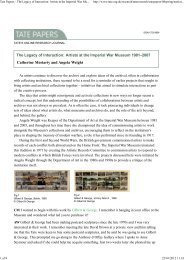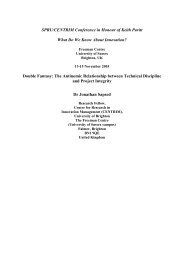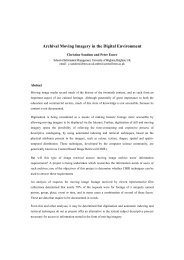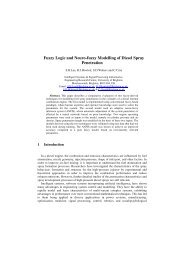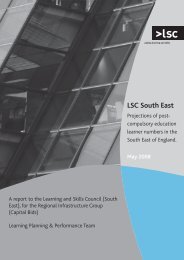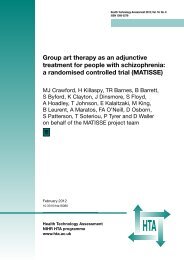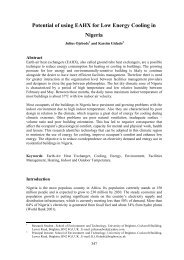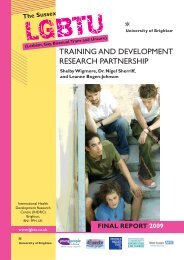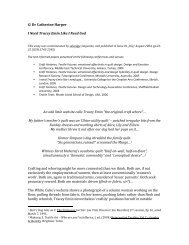TOP TIP - University of Brighton Repository
TOP TIP - University of Brighton Repository
TOP TIP - University of Brighton Repository
You also want an ePaper? Increase the reach of your titles
YUMPU automatically turns print PDFs into web optimized ePapers that Google loves.
Practitioners we spoke to confirmed<br />
many <strong>of</strong> the key characteristics<br />
reported by Mordaunt (2005).<br />
Similarly, ContinYou’s (2005b) Top<br />
Dads also identifies a number <strong>of</strong><br />
qualities important for those working<br />
with young fathers. A number <strong>of</strong><br />
workers told us that confidence and<br />
the ability to challenge other<br />
pr<strong>of</strong>essionals is an important quality.<br />
Fathers Plus, the TPSS in Hull,<br />
Lewisham Young Fathers Project, and<br />
the Health Initiatives Team at<br />
Education Leeds all highlighted that<br />
challenging attitudes was an important<br />
skill to develop. Workers need to be<br />
able to promote the idea that young<br />
fathers work is not just the remit <strong>of</strong> the<br />
dedicated young fathers worker’s role,<br />
but is the whole team’s responsibility.<br />
They also need to be able to tackle<br />
fellow pr<strong>of</strong>essionals who hold<br />
stereotypical negative views about<br />
young fathers.<br />
Practitioners also told us that in order<br />
to encourage others to work with<br />
young fathers, individuals need<br />
appropriate training to ensure that it is<br />
done in a way that encourages a<br />
‘whole team’ approach to engaging<br />
routinely with mothers and fathers.<br />
Yet despite the obvious importance <strong>of</strong><br />
staff training, TSA’s Young Fathers<br />
Project shows that it is frequently<br />
overlooked as time and budget<br />
pressures are focused on setting up the<br />
work, and then developing it. There<br />
are a number <strong>of</strong> key organisations that<br />
<strong>of</strong>fer training for individuals working<br />
with young fathers. Details are<br />
provided in ‘Top Tips’.<br />
✱ <strong>TOP</strong> <strong>TIP</strong>S ✱<br />
PROMISING PRACTICE<br />
Trust for the Study <strong>of</strong> Adolescence (TSA)<br />
Offers training and conferences on a wide range <strong>of</strong> subjects including working with<br />
young fathers, working with young men, developing positive self-esteem in young<br />
people, developing training skills, and many more. Training courses can be tailored<br />
to specific requirements, or be designed from scratch to meet specific needs.<br />
The Working With Young Fathers course covers a number <strong>of</strong> areas including:<br />
✱ successful approaches to engaging young fathers<br />
✱ what’s happening where in England<br />
✱ what young fathers say about support<br />
✱ one-to-one and group work<br />
✱ peer support<br />
✱ being strategic<br />
✱ working with very young fathers<br />
✱ the worker gender debate.<br />
Contact: Lise Hansen or Sarah Lee (Training Co-ordinators),<br />
Tel. +44 (0)1273 771 249 or Website: www.tsa.uk.com<br />
Working With Men (WWM)<br />
Offers a range <strong>of</strong> training courses on working with boys and young men including<br />
masculinity, working with young fathers, what works with fathers, working with<br />
violence, boys and underachievement, managing work with boys, sexual health and<br />
young men, and more. WWM also run a programme <strong>of</strong> workshops which aim to<br />
benefit and equip pr<strong>of</strong>essionals whose work impacts upon young people, especially<br />
boys and young men.<br />
Contact: Trefor Lloyd, Tel: +44 (0)20 7732 9409 or<br />
Website: www.workingwithmen.org/training<br />
Fathers Direct<br />
Run one, two, and three day courses on Working with Young Fathers. The courses<br />
can be run in-house, or for a consortium <strong>of</strong> local agencies. Amongst other things, the<br />
training aims to help participants:<br />
✱ understand young fathers’ roles in child development<br />
✱ examine attitudes and feelings towards young fathers<br />
✱ develop the confidence, knowledge and skills needed to encourage positive<br />
relationships between young fathers and their children<br />
✱ plan effective needs-led approaches<br />
✱ explore and develop strategies to overcome barriers in trying to integrate<br />
services for young fathers into mainstream provision<br />
✱ explore cultural and personal assumptions about men and fathers<br />
✱ learn key approaches and techniques in working with young fathers<br />
✱ reflect on working practices<br />
✱ examine ways <strong>of</strong> working in partnership with young mothers and the wider<br />
families <strong>of</strong> both the mother and father<br />
✱ learn how to stay well-informed and supported as work with young fathers<br />
develops.<br />
Tel: +44 (0)845 634 1328 or E-mail: training@fathersdirect.com<br />
Supporting Young Fathers 43



